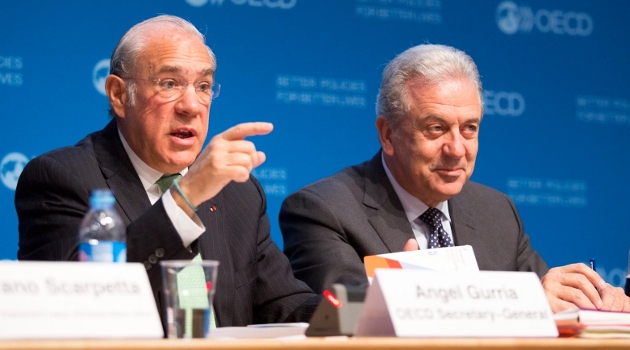This article appeared in The Daily Caller on May 20, 2015.
Numerous scandals have put the IRS under intense public and political scrutiny. A broad and growing consensus has also emerged that the U.S. tax code is in dire need of comprehensive reform. But while solutions to these two pressing problems are debated by elected officials, it is the activities of unelected global tax bureaucrats at the Organization for Economic Cooperation and Development (OECD) that might have the biggest impact on Americans in the immediate future.
Congress must step in to assert U.S. and taxpayer interests before it is too late and the global tax system is radically transformed.
The OECD began its Base Erosion and Profit Shifting (BEPS) project two years ago. It was put forward as an answer to a perceived hole in the collection of corporate taxes, a problem they describe as “double non-taxation.” That’s a fancy way of saying that corporations, just like individuals, seek jurisdictions with favorable tax policies and otherwise look to minimize their tax burdens.
Rather than heed the advice of economists who warn that excessive taxes drive away business, politicians in high-tax nations have come to resent that the private sector is allowed to react rationally to onerous taxes. Through global coordination of tax collectors and a series of convoluted rules, the BEPS project aims to reduce the effectiveness of such tax planning and prevent taxpayers from making the rational decision to work and invest where taxes are favorable.
Tax competition describes the process by which nations compete to attract businesses, citizens, and investment. It helps restrain political greed and promote pro-growth economic policies. When forced to compete over businesses and investment, politicians extract less from the productive sector than they might otherwise desire. That is good for growth, but is nevertheless precisely what has the OECD upset.
BEPS proponents claim corporations are not paying their fair share, but corporate tax revenues as a percentage of GDP across the OECD roughly matches pre-recession numbers and shows little change over the last several decades, suggesting an ulterior motive.
That was made clear in 1998 when the OECD released its “Harmful Tax Competition” paper. The evolution of that effort in the years after provides further insight into the likely outcomes of today’s BEPS initiative.
When the United States, which benefits the most from international capital flows, objected and led a backlash to the OECD’s 1998 attack on tax competition, the organization shifted its public focus but not its goals. It began instead an effort to root out tax evasion, with its proposed solutions unsurprisingly tending to restrict or undermine competition. It also frequently and tellingly lumped together tax evasion with avoidance, even though the latter is legal and moral while the former is not.
A defining characteristic of the OECD’s efforts is the constant moving of goal posts. First it demanded, under threat of blacklisting, that jurisdictions adopt a certain number of tax information treaties and agree to information exchange upon request. Next came the requirement to submit their tax policies to “peer review” and judgment from the tax collectors of high-tax nations.
Recently they’ve asserted that information exchange upon request – such as when there is actual evidence of evasion or wrongdoing – is not good enough, and are demanding creation of a global tax cartel committed to automatic information transfers regardless of whether there is suspicion of guilt. It’s the tax collection equivalent of NSA spying.
With this context it’s easier to see why the BEPS initiative is a bigger threat to the global economy than is suggested by the rhetoric of its proponents. Like the anti-evasion effort, the BEPS project will be constantly expanding in depth and scope until the OECD achieves its goal of ending tax competition through rate harmonization. That’s bad news for taxpayers and the global economy.
Without input from Congress, the Obama administration has cheered on this overseas process at every stage.
His most recent budget proposal also supports expanding IRS collection authority and information sharing with other nations in anticipation of OECD recommendations. This is especially troubling given the IRS’ proven lack of respect for privacy rights and its inability to protect sensitive information.

